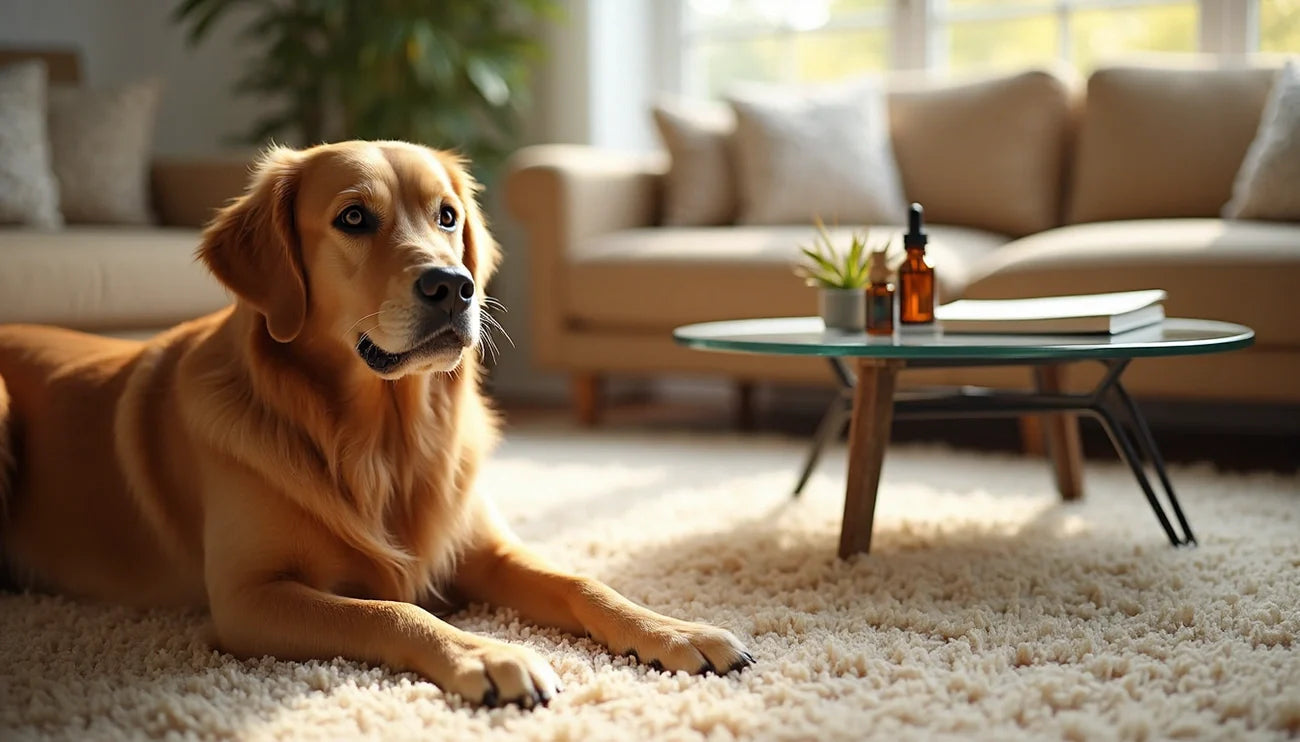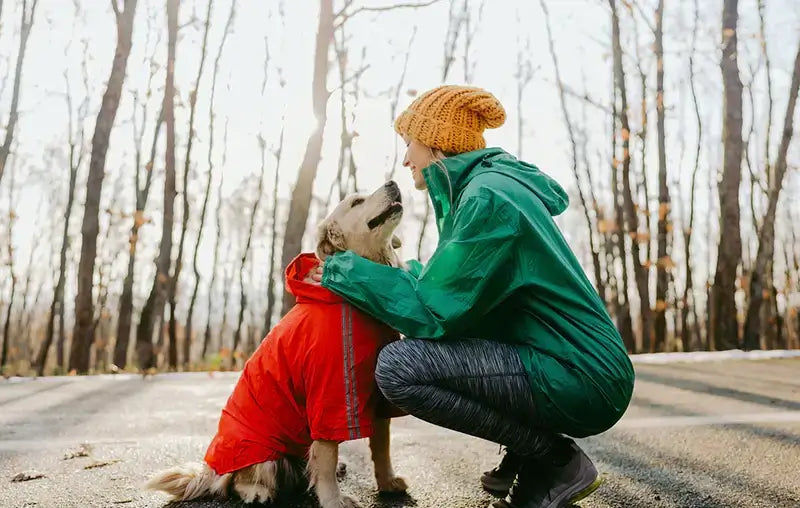
As a pet parent, you love your dog and want to do everything possible to keep your canine companion happy and healthy. However, sometimes our furry friends can drive us nuts. If you’ve experienced a restless dog that won’t let you sleep at night, you know what we mean.
Luckily, there are ways to fix this. Once you diagnose the problem, you can help your dog (and yourself) get more sleep with a few simple fixes — creating a healthy sleep environment, offering your dog a Hip and Joint Soft Chews for Dogs and ensuring your pup gets plenty of exercise.
To that end, this handy guide will discuss why your nervous dog might be having trouble settling down at night and a few tips on how to calm a restless dog at night.
Why Is Your Dog Restless at Night?
Before you can help your dog rest more peacefully, you have to determine what’s causing their restless behavior. There are many reasons dogs can have trouble settling down when it’s time for bed. Some of the most common include:
- Fear – Dogs need to feel safe and secure to settle down at night. If you’ve recently adopted your new pal, they might still need time to adjust to your home. If your dog has recently had an upsetting experience (like sitting through a thunderstorm), they might need a little more cuddle time from you to establish a safe feeling.
- Temperature – If you constantly hear your dog panting at night, the room temperature might be to blame. Dogs pant to cool themselves, so nighttime panting might mean your dog needs a cooler sleeping space. However, panting can also be a sign of a more serious issue. As such, a veterinarian consultation might be needed if temperature adjustments don’t solve the problem.
- Aches or discomfort – Old dogs might experience more joint stiffness and discomfort, just like humans. This may cause it to have trouble getting comfortable at night. Discomfort can also be a signal that something else is wrong, such as illness or injury.
- Boredom – Have you ever had a hard time falling asleep at night after a couch potato day? As a pet parent, you need physical activity to burn off some of your excess energy and so does your dog. If your dog is home alone all day, it might be lacking the attention it craves to keep its mind and body occupied.
Focus on your dog’s behavior for a few days. Do they exhibit signs of discomfort? Are they getting enough attention during the day? Once you have an idea about the cause of their restlessness, you can begin to make changes to help solve the problem.
Tip 1: Make Your Pup Feel Safe
As a pet owner, the first thing you can do to ensure a restful night for you and your furry friend is to make your pup feel safe.
There are many reasons dogs can be fearful, such as:
- A lack of confidence
- Poor socialization during puppyhood
- Trauma earlier in their life
- Overly sensitive nature
All of these can lead to problems that carry over into your dog’s sleep.
The good news is that you can proactively help your pup feel safe and secure in your home.
Trying some of these techniques might make your nights quieter and more restful.
Give Them a Safe Place to Sleep
When you’re sleeping, you’re at your most vulnerable. Your dog understands this and has trouble relaxing when it doesn’t have a safe space to sleep. Ensuring that your canine pal has a secure and comfortable dog bed can help them drift off more peacefully. Ideally, your dog should have:
- An appropriate bed for its size
- A soft blanket or pillow
- A crate (if preferred)
Not every dog likes a crate, butsome prefer sleeping in a space that is their own. It might take a little time and experimentation to find out what your dog prefers, but you’ll be glad you did when you can sleep through the night without disturbance.
Make Sure a Soft Toy is Nearby
When you were a child, did you have a favorite stuffed animal? Do you remember how hard it was to fall asleep if you couldn’t find it? Dogs can also become attached to toys. Toys perform several roles in a dog’s life, including:
- A way to exercise hunting, retrieving or other instincts
- Association with a positive memory such as you playing together
- Comfort as a part of its work and routine
Making sure that you grab your pup’s favorite toy every night before you head to bed can help your pup have a calmer night.
Keep Their Bed Close to Your Bed
Dogs are pack animals that develop close bonds with the people who care for them. If you have a pup who struggles to settle in at night, the solution could be as simple as moving its dog bed close to yours.
This allows your furry pal to keep an eye on you while you sleep. They won’t feel the need to get up and check on you when you’re close by.
Stick to a Consistent Bedtime Routine
Humans aren’t the only species that can benefit from consistency. A regular bedtime routine can also help your pup get better sleep at night. The American Kennel Club (AKC) recommends setting a routine for bedtime to help a puppy (and adult dog) understand the difference between playtime and sleeping time.
Tip 2: Tire Your Dog Out During the Day
If your puppy or adult dog continually mistakes bedtime for playtime, they might not be getting enough activity during the day. The specific amount of exercise your dog needs each day varies, depending on their:
- Age
- Breed
- Health
Some breeds have boundless energy and need more active time throughout the day. Your older dog might need less activity but still, require daily walks and playtime. Trying some of these tricks can help ensure your dog has spent its energy and is ready to fall into a restful dog sleep when bedtime rolls around.
Give Your Pup Plenty of Exercise
Physical and mental exercise are both musts for your dog’s overall health and wellness. They’re also necessary for restful sleep. The AKC offers the following exercise recommendations, although your dog’s specific needs may vary:
- One to two 30-minute walks per day
- Hiking, swimming, fetching and running ability courses
- Jogging alongside you
- Exercising their brain muscles, particularly for breeds like Border Collies and Poodles
It might take a little trial and error to figure out your dog’s needs for both physical and mental exercise.
Sneak in a Round of Playtime Before Bed
Even dogs that get plenty of daily exercise might have a case of the zoomies before bed. This can mean he still has some excess, pent-up energy, orhe just wants a little more attention from you. A quick play session can help settle him down so you can both get a restful night of sleep. Learn more strategies to help your dog sleep.
Get Them a Pal
Some dogs are perfectly content being your pack-mate, while others crave canine companionship. If your pup seems lonely or bored, a canine pal might be what your pup needs. Before you add a second dog to the mix, there are a few things to consider, such as:
- Do you have the space and financial capacity for another dog?
- Will you have enough time to give both dogs the attention they need?
- Does your dog get along with other dogs?
While it’s tough to tell with certainty if your dog can live happily with a canine pal, you can test the waters. Try bringing your dog to a dog park and setting up playdates with other pups. This will help you assess your dog’s readiness to add another dog to the family.
Tip 3: Help Your Dog Feel Calm and Relaxed
You know the feeling: it’s the middle of the night, and you can seem to settle down and fall asleep. You’re obsessing over your next deadline or an upcoming appointment. While our canine pals don’t have the same obligations to worry over, they can have trouble settling down for sleep, just like you.
Luckily, there are things you can do to help keep your pet calm and relaxed.
Play Some Calming Music
Have you ever turned on some soft, peaceful music when you needed to relax? It turns out that people aren’t the only ones who can use calming music to settle their minds — dogs can also benefit from soothing tunes.
A study in the Journal of Veterinary Behavior found that dogs in high-stress situations, such as a kennel environment, showed behavior changes when they were exposed to certain music, including:
- Classical music led to more sleep and less barking
- Heavy metal music affected their activity level
- Loud music also led to more shaking and barking
Playing some classical tunes before bed might help settle your pup down and put him in the mood to get some rest.
Try a Soothing Massage
You know your dog loves pets, but did you know that your furry pal might also benefit from specifically targeted massages? If your dog has trouble getting ready to go to sleep at night, an evening massage might help. The AKC recommends:
- Finding a quiet place in your house
- Using gentle, long, sweeping motions when massaging
- Starting from the head and neck and working your way down the body
- Avoiding pressing too hard and stopping if your dog seems to be uncomfortable
A pre-bedtime puppy massage might help settle your pup down and signal that it’s time for sleep.
Make Bedtime Cuddle Time
Many dogs love cuddling with their person or people. If this is your dog, try making cuddling a part of your pre-bed ritual. This gives your pup a final chance to bond with her human before they go to sleep. And, let’s be honest, you benefit from bonus puppy cuddles too.
Give Them a Calming Bedtime Snack
Some dogs might benefit from CBD chews before bed. Chews such as Zebra Calming Chews for Dogs are formulated to provide help for restless animals. If your dog has trouble settling down, then a CBD chew may help keep your dog calm and relaxed.
Your dog will appreciate the opportunity to have an extra bedtime snack, and you might enjoy a quieter night.
Tip 4: Make Sure All of Your Pup’s Needs Are Met
You can’t sleep well if you’re hungry or thirsty. Neither can your furry pal. You’ve also probably experienced that obnoxious pull of a full bladder as you begin to drift off to sleep — you don’t want to get out of your cozy bed, but you know if you don’t, you’ll be awake for hours. You pup can feel the same way!
Taking a few moments to ensure your dog’s needs are met before bedtime will help give you both a better night of rest.
Check Their Food and Water Bowls
There are some conflicting opinions on when it’s best to feed your dog. Puppies can sleep better on a full stomach, so it may be best to feed them before bedtime. However, be aware that they may also need to get up and use the bathroom during the night.
When it comes to water, some dogs like having access to water at all times and might wake you up during the night if they get thirsty. Others will sleep through the night without needing a drink.
In short, making sure you’ve established a food and water routine and sticking to it will help ensure you aren’t woken up in the middle of the night by a hungry and thirsty pup.
Try One More Potty Break
Lastly, it’s always wise to give your dog a final chance to relieve himself right before bed. To ensure this is a productive trip, you can:
- Allow your pup time to sniff and do its business
- Skip any playtime and keep it strictly to a bathroom break
- Ensure your pup goes right to their sleeping area when they come back inside
This will signal to your canine friend that the evening is over and it’s time to go to sleep.
How Do You Know if You Need to Contact Your Veterinarian?
Many of the reasons your dog has trouble calming down for a restful night of sleep are benign and easy to solve. However, some situations call for a veterinarian consultation, such as:
- Restlessness paired with sudden weight gain or loss
- Unusual aggressive behavior
- Diarrhea, vomiting or constipation
- Lack of appetite
- Sudden changes in behavior
- General lethargy
Some of these actions and behaviors can be a sign of a more serious problem or medical issue. It’s always best to speak with your veterinarian for your peace of mind if you’re concerned about your furry pal.
Help Your Dog Remain Calm and Relaxed at Bedtime With Zebra CBD
Good, restful sleep is a must for your and your pup’s health and wellness. However, if your canine companion is keeping you awake at night, there are many solutions you can try, from cultivating a cozy sleep environment to ensuring each of your pup’s needs are met before shut-eye.
Of course, you can also give your pup a calming bedtime chew, such as Zebra Calming Chews for Dogs to help your pup stay calm and relaxed. CBD acts as a natural calming remedy for dogs.
Our lineup of dog-friendly CBD products comes with the same label-accuracy guarantee as our human CBD products, meaning you can feel confident sharing our premium CBD products with your best furry pal. Learn more about CBD dosage for dogs and sleep soundly with Zebra CBD.
Sources:
PetMD. Is Your Dog Keeping You Awake at Night? https://www.petmd.com/dog/training/evr_dg_sleepless_nights
Best Friends. Building Confidence in Dogs. https://resources.bestfriends.org/article/building-confidence-dogs
American Kennel Club. How to Make Sure Your Puppy Gets Enough Sleep. https://www.akc.org/expert-advice/health/how-much-do-puppies-sleep/
American Kennel Club. How Much Exercise Does Your Dog Need? https://www.akc.org/expert-advice/health/how-much-exercise-does-dog-need/
Journal of Veterinary Behavior. Behavior Effects of Auditory Stimulation on Kenneled Dogs. https://www.sciencedirect.com/science/article/abs/pii/S1558787811001845
American Kennel Club. How Can Massage Help Your Dog? https://www.akc.org/expert-advice/health/massage-can-help-your-dog/
PetMD. Signs Your Dog Is Stressed. https://www.petmd.com/dog/centers/nutrition/signs-your-dog-is-stressed










